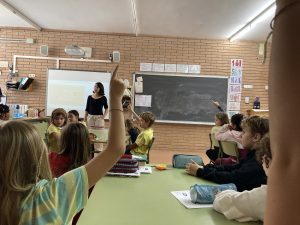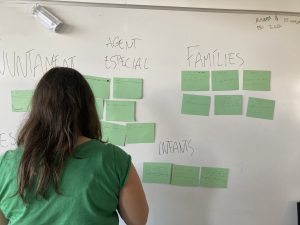Introduction
Three sequential phases are commonly identified in the history of researching children, and research from all phases continues to be conducted today. Initial endeavors focused on researching about children were strongly influenced by developmental theories, and used predominantly quantitative methods. In the second phase, following the development of the United Nations Convention on the Rights of the Child (UNCRC) in 1989 and the emergence of childhood studies in the early 1990s, and informed by feminist and postmodern theories, many researchers turned to engaging children more directly. Researchers focused on researching with children and utilized a wide range of data-generating methods with the aspiration they would ‘give’ children agency and autonomy, and more authentically represent their ‘voice.’ Participatory methods in particular were seen as a way to attenuate the power relations between researchers and children. In the third and current phase, there has been a call to recognize that children live their lives in relationships with adults and peers and conceptions of the child as predominantly agentic, autonomous, and independent have been critiqued. The influence of Indigenous worldviews and posthumanist theories have strengthened the call for research that recognizes that children’s lives take shape through their relational encounters and entanglement with humans (intra- and inter-generationally) and more-than-humans, including animals, plants, material artifacts, and technology. Indigenous research in particular has powerfully shown that children’s lives are mediated by the worldviews and practices of their cultures. These latest developments have led to some arguing it is time to decenter abstract conceptions of the child and childhood; research involving children needs to be conceptualized and conducted in a way that identifies the practices that enact categories of the child and childhood in particular places in time and space. Hence a more encompassing form of ‘researcher reflexivity’ is foregrounded in this third phase: a reflexivity looking to move beyond the positionality of the researcher and bias and interrogate how the embodied researcher—with their emotions, ontological assumptions, cultural values, theoretical frameworks, and research tools—shapes and constrains both the research process and the knowledge that is produced with children as ‘children’s voice.’ Alongside these methodological concerns, researchers continue to refine and critique methods of data generation and analysis, encouraging more transparency, and interrogating the contribution of methods to research integrity. The scholarship reviewed in this article focuses on examples of research and debates from phases two and three.
General Overview
As the field has continued to mature and critical and more expansive understandings of relationality have emerged to include all entities (e.g., Malone, et al. 2020), key tenets such as the participation of singular, agentic children and ‘giving voice to children’s voices’ have been more critically debated. Horgan, et al. 2017 and Ergler 2017 argue for a more dynamic relational model of participation. Malone, et al. 2020 advocates for research that recognizes children’s lives are deeply embedded in more-than-human relations and in a context of a transforming unpredictable unsustainable future. Jenkin, et al. 2020, foregrounding intersectionality, works to find culturally appropriate ways for children with disabilities and living in the Global South to participate in research. Researcher reflexivity has been subject to increasingly critical appraisal; while it continues to have prominence it has not been clear what it looks like in practice. Blaisdell 2015 and Kontovourki and Theodoru 2018 make transparent the way their researcher positioning and the structures and processes of their research contribute to the knowledge produced and how children’s voices are represented. Ethical dimensions of research have also received critical attention. For example, The Ethical Research Involving Children (ERIC) project, an international collaboration aimed at strengthening ethical practices throughout each stage of the research process, has proposed an ethical framework involving ‘Three R’s’: Rights, Relationships and Reflexivity (Truscott, et al. 2019). Furthermore, there is an increasing focus on the way in which institutional ethical guidelines developed from Western thought privilege Western values and principles and ways of interacting, and ignore those of the Global South. Flewitt 2019 argues that institutional ethical review processes and codes are culturally bound and hence not responsive to particular social contexts. Abebe and Bessell 2014 and Jenkin, et al. 2020, researching in the Global South, illustrate ways in which formal ethics and local ethos and ways of being can both be respected and negotiated. In addition to these debates, researchers are deepening critiques of specific methods and their relationship with methodologies. Heydon, et al. 2016 critiques the possibilities and problematics of visual methods, and argues for the need to examine the relationship between the visual methods used and the methodological aspects of research. Flewitt 2019 opens up issues that emerge when researchers engage with online and offline digital tools when researching with young children. These lines of critique argue for the need for research that is critical, reflexive, and built from dialogical relationships between those involved.










